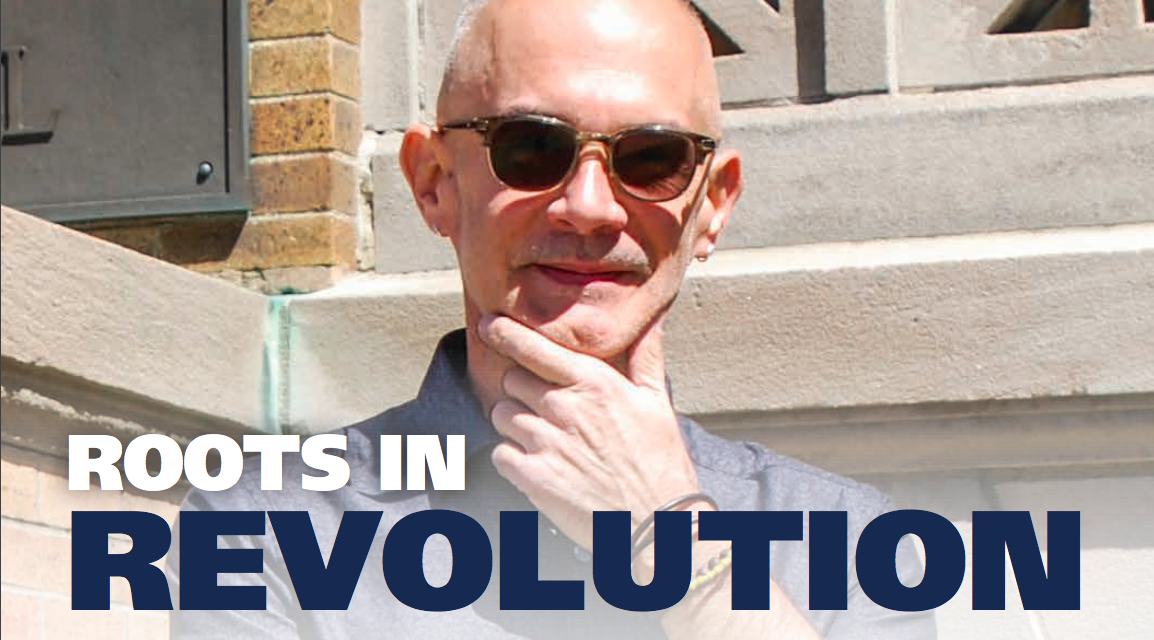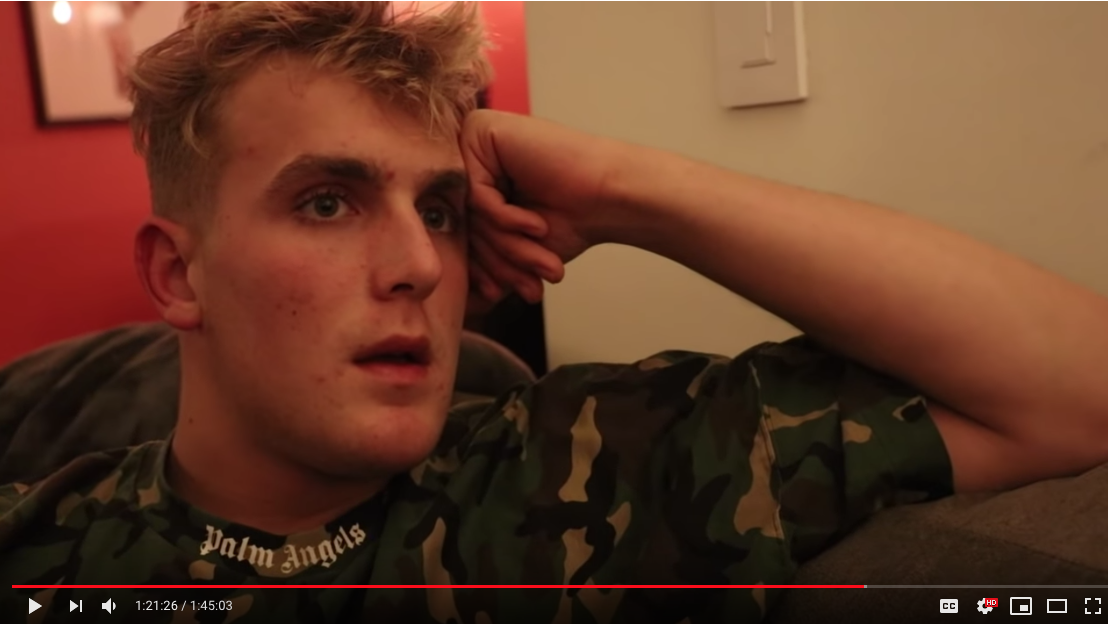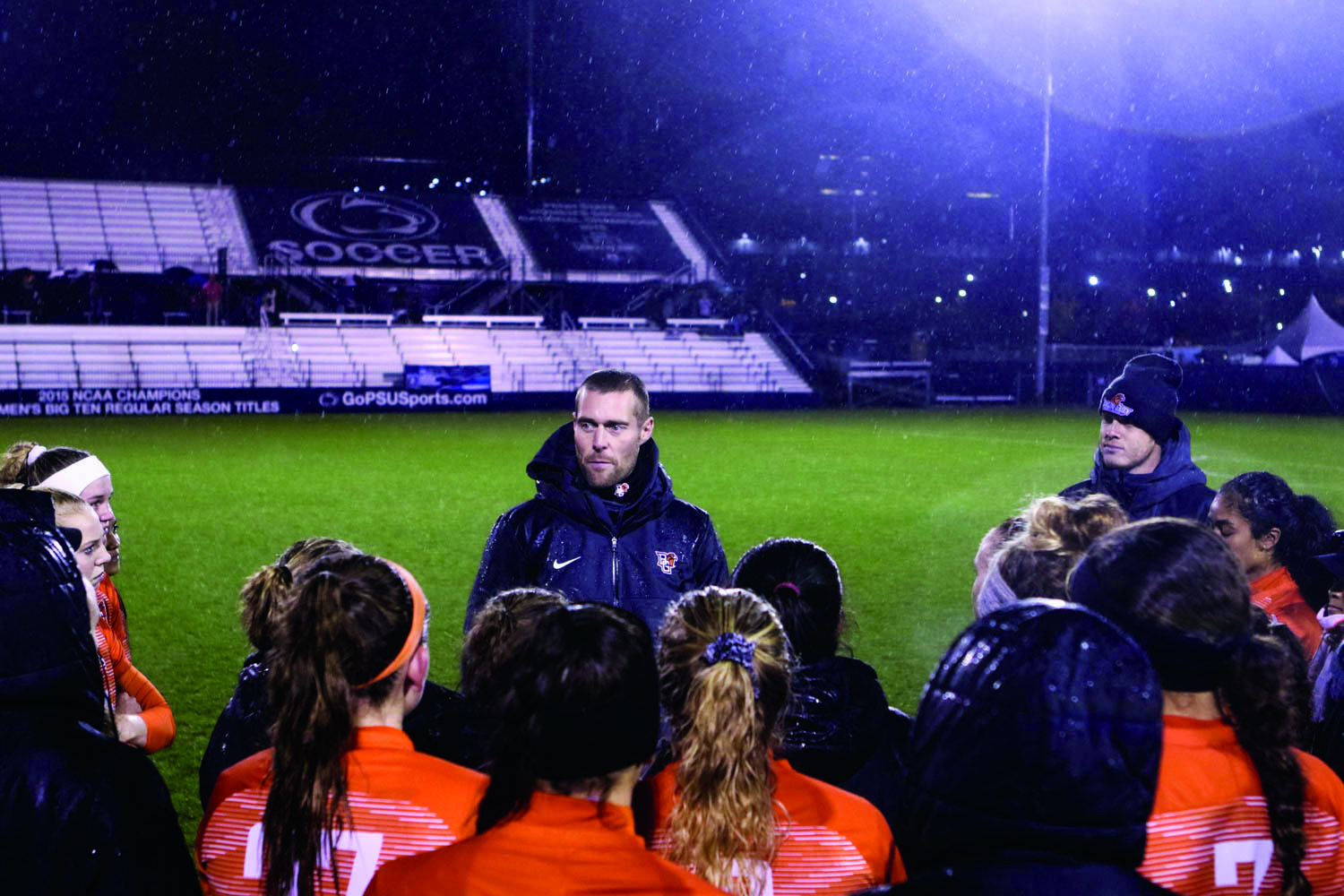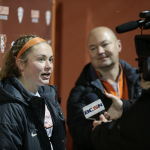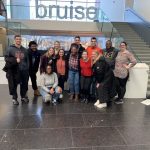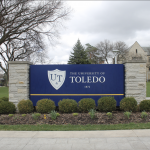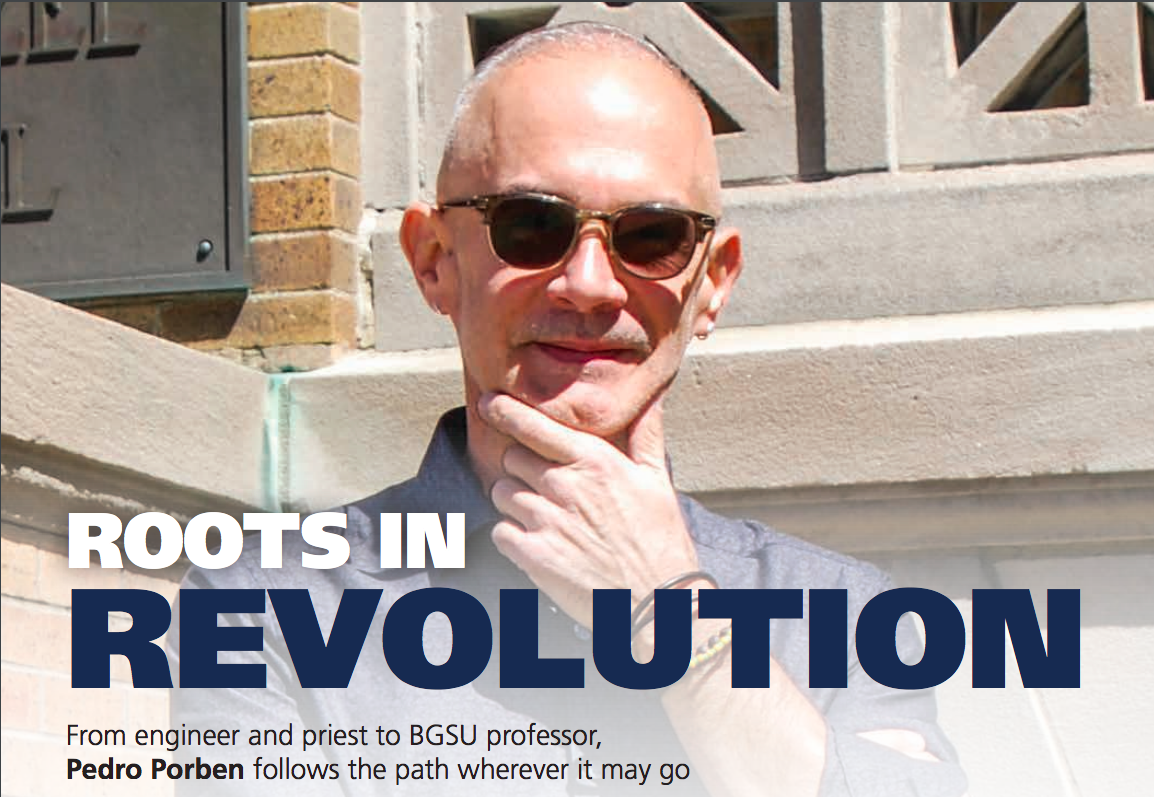
By Mary Ross | Spring 2019
The aftermath of the Cuban Revolution. A lack of a clear career path leading to explorations in engineering and priesthood. A period of ten years awaiting citizenship. A realization about the career path that best suited him. Becoming a teacher, a mentor and a friend. These events are the mere beginnings of the life events of a Spanish professor at BGSU, who has impacted the lives of many, Pedro Porben. Porben grew up in a little town in Cuba, outside of the capitol La Habana. He grew up in the aftermath of the Cuban Revolution and during the reign of Fidel Castro. Upon completing Cuba’s version of high school, Porben decided to attend university in La Habana, studying engineering. Yet, Porben felt this career path wasn’t the right choice for him.
“I discovered that I actually wanted to write, and I wanted to get involved with something different. I discovered I had a desire and passion for philosophy and ‘literatura,’ literature, but I didn’t have direct access to those fields,” Porben said. In the Cuban education system, schooling is free and provided for the people by the government. However, to have access to fields such as philosophy and literature, a citizen must declare an affiliation with the Communist Party, which Porben refused to do. Not having access to those fields, he was unsure on how he could explore them. After a friend recommended joining the seminary, which would grant him access to these fields, Porben enrolled — but there was a catch.
“I was not into religion. I was not into following Christ. I was not into that religious stuff at all. But the libraries and access to knowledge that I was not acquiring at the university. In my mind, I was like this is a very good compromise because I can actually acquire the knowledge. That didn’t work. Obviously, that didn’t work,” he conceded. But there was more to Porben joining the seminary than just gaining access to more knowledge. He was also attempting to figure out who he was through trying to find God. “In a sense, my idea of trying to find God through becoming a priest was due to that confluence of not understanding what was going on in my own head, in my life, in my own political views and religious views and trying to understand what God means.
I was having a complex existential crisis in a country where you’re not allowed to have an existential crisis,” Porben said. Although Porben ultimately withdrew his enrollment in the seminary, he didn’t stop trying to find ways to learn about fields restricted to him. After withdrawing his enrollment from the seminary and opting to take time off school to avoid trouble with the Castro Regime for creating awareness for acts the regime was trying to cover up, Porben was hired by the Catholic Church to assist in the creation of a magazine. By working on this magazine for the church, Porben was granted access to the same resources the seminary had allowed him access to. “Using church resources to write and to access information, I ended up doing what I wanted in a different way. You have to do what you can do and use the system to your advantage,” he said. Porben decided to return to school to study engineering after a semester off, but he remained working for the magazine for a few years to come, only deciding to resign once the regime began threatening the people working for the magazine.
Around this same time, Porben’s father left Cuba with a visa to visit his brother in Puerto Rico. While in Puerto Rico, Porben’s father attempted to extend his visa to his family, with a plan to have his family remain illegally in Puerto Rico if the visa was permitted. When this family visa was denied, Porben’s father decided to take a more dangerous path. “He found a guy that smuggled people and that guy took us from Cuba to Costa Rica, Chile, Argentina, Uruguay and then the U.S. We traveled to different countries in Latin America for a couple of weeks to end up in Miami.
Along the way, we lost our identities because we traveled with a fake passport to every single country. We entered the U.S. without passports. In 1998, if you arrived in the U.S. without a passport, you were not automatically deported. You were sent to a detention camp in Miami and if you had some relative, they could come and claim you and you would leave the detention center and apply for citizenship,” Porben said. This is exactly what happened to Porben and his family, who were all claimed by his uncle and consequently applied for citizenship. Porben received his citizenship in 2007, 10 years after first leaving Cuba the first time.
Porben went to live in Puerto Rico with his family, but decided after a few years to move to Ohio, where he began working for the University of Toledo. Upon moving to Ohio, Porben applied to several master’s programs to continue his education. He decided to enroll at BGSU, where he received his master’s degree in Spanish. He then began applying to doctorate programs. Nonetheless, he was still unsure of what career he eventually wanted to do.
“I applied for like twenty-million doctorate programs. But again, I was not really clear that that was what I wanted to do. As a matter of fact, I went to an interview on a campus and I said to the interviewers, ‘I don’t like this,’ and they were like ‘what?’” Porben said with a laugh.
Despite admitting this, he decided to attend the University of Michigan for his doctorate. It was here he met Alejandro Herrero-Oláizola, who inspired Porben to become a professor. “He changed my life completely. He was a friend, professor, excellent advisor and beautiful human being. He gave me the tools to start loving being a professor,” Porben said about Herrero. Herrero did this by helping Porben uncover his passion for expressing ideas.
“In that process of becoming, I learned that I have a passion for expressing ideas. If you want to be a professor, you need to love what you do. You need to love communicating stuff to people. Not from a ‘I’m right, you’re wrong’ point of view but a ‘let’s share knowledge.’ That idea of creating a knowledge community, of creating a space for ideas to be exchanged is what I want,” Porben said.
This passion for expressing ideas is refreshing and motivating to many of the students who have taken and are taking classes with Porben. “Some teachers lose sight of actual learning because they are too preoccupied with grades, but Pedro was just about learning. It was really refreshing. You had to rise to that.
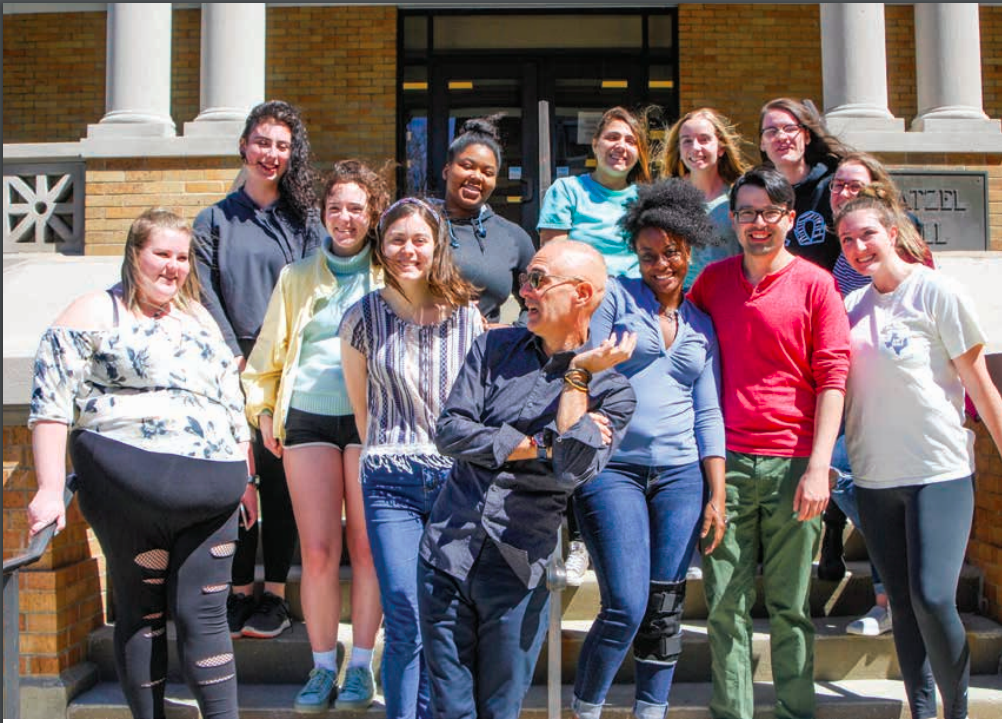
Instead of doing something just for a grade, you would do something because you wanted to learn it because Pedro and the way he spoke made it sound so important because he was so in love with what he did,” Emily Ryan, a sophomore studying communication disorders and one of his past students, said. In his classes, Porben uses his love of expressing ideas to help students develop new perspectives through lessons he teaches and conversations he facilitates.
“He always takes a different lens than what you are used to seeing here so it’s like a fresh perspective, it’s new,” Jessica Corte, Porben’s teaching assistant and one of his graduate students, said. Ryan agreed with Corte, discussing how Porben uses his perspective to create thought-provoking lessons.
“Everything that you’re talking about, you see its importance, or you see an injustice in the world. We would watch something, and we would identify it for ourselves. In the class, it was very apparent that everything we were learning about had real-life application,” Ryan said. Porben implements his fresh perspective in a way which motivates students to share their ideas without feeling any sense of judgment or force.
“Pedro creates an atmosphere that is very relaxed. You feel very comfortable sharing what you’re thinking and your own analysis of whatever you’re discussing,” Ryan said. Moreover, not only has Porben motivated his students to consider new perspectives and dive deeper into important topics, but he has inspired his colleague and longtime friend, Francisco Cabanillas, to expand his horizons.
“Because of him, I have opened up myself,” Cabanillas said. Although Porben has made a mark on both students and coworkers alike, this is not a goal of his. “Part of the issue with humanity is we want to make a mark, we want to leave something behind. We want to impress people. We want to change one’s mind.
I just want everyone to be a decent human being that values life and values the other, regardless of how you define the other. The best you can do in life is try to understand. Try to critically analyze who you are, your own personality and your own place,” Porben said. These ideas are manifested in the many projects on which Porben is currently working to put into action.
This includes creating a class in which students would study Puerto Rico during the semester and during Spring Break of 2020, students would then visit an impoverished community in San Juan, Puerto Rico. In San Juan, they would participate in service projects, such as working in a soup kitchen or creating a mural for the community with other teenagers who are living in extreme poverty and are prone to experiencing gang violence.
This trip is important to Porben because he feels it would give people a new perspective on life through witnessing the struggles of other people. “People are suffering. People are struggling. We spend so much time complaining about our lives and not caring for the other, instead of spending more time helping in a way.” He hopes this experience will motivate students to make a difference in the world and their own lives.
“They would be helping other human beings to express pain and to experience how they feel about violence in general. Receiving that emotion and feedback from someone you don’t know in a different country can change your life and impact who you are,” Porben stated.
“Part of the reason why we are so invested in this idea of working with the community at large is because pain is a huge motivator. It can change your life forever or it can kill you. I’m saying go experience what the people are suffering through and try to make a change.”
All things considered, Porben has faced adversity many times throughout his life. But despite this, he has strived to make the world a more accepting and more caring place.

